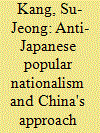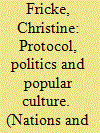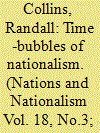|
|
|
Sort Order |
|
|
|
Items / Page
|
|
|
|
|
|
|
| Srl | Item |
| 1 |
ID:
122522


|
|
|
|
|
| Publication |
2013.
|
| Summary/Abstract |
This paper explores the relationship between anti-Japanese popular nationalism and China's approach towards Japan amid Sino-Japanese political tension from 2001 to mid-2006. Among various factors that may affect the relationship, this research focuses on the interaction between the government and the public expressions of anti-Japanese nationalism in China. Throughout most of this period, Sino-Japanese political relations were seriously strained by historical, territorial and other controversial issues, which stirred up anti-Japanese sentiment in China. However, it was only between 2003 and the spring of 2005 that mass anti-Japanese protests were allowed, or at least tolerated, by the Chinese authorities and played a role in Beijing's handling of Japan-related controversies. The paper examines China's domestic political situation during the leadership transition from the third to fourth generation of leaders, which it claims drove the Chinese government's lenient response to popular anti-Japanese protests and enhanced the prospects for popular nationalism to affect the government's approach towards Japan.
|
|
|
|
|
|
|
|
|
|
|
|
|
|
|
|
| 2 |
ID:
143784


|
|
|
|
|
| Summary/Abstract |
2012–2013 witnessed a renewed flare-up of anti-Japanese sentiment in Mainland China, followed by a toughening of the People’s Republic of China’s (PRC) Diaoyu Islands policy. Did popular nationalism influence the PRC’s military escalation? A lack of transparency in elite Chinese decision-making puts a definitive answer to this question beyond our reach. However, this article utilizes qualitative and quantitative analyses of anti-Japanese discourse and deeds in both cyberspace and on the streets of urban China to argue that the circumstantial evidence is compelling: nationalist opinion is a powerful driver of China’s Japan policy. The demands of nationalist legitimation appear to pressure the elite to respond to popular nationalism. Should one or more Chinese die at the hands of the Japanese navy or air force, therefore, the popular pressure for escalation and war will likely be more than China’s leaders can manage.
|
|
|
|
|
|
|
|
|
|
|
|
|
|
|
|
| 3 |
ID:
120367


|
|
|
|
|
| Publication |
2013.
|
| Summary/Abstract |
National days are powerful moments of commemoration that aim at renewing the citizens' bonds to the nation and the state. In order to be successful, public rituals need to draw large audiences, and their ceremonial design therefore has to be adapted to suit the masses, employing elements of popular culture and everyday forms of nationhood. Despite drawing its significance from the declaration of independence in 1960, however, Gabon's independence jubilee was less concerned with history and commemoration than with celebrating the state and the nation in the present. The ceremonial design of Gabon's jubilee featured intensive preparations, official ceremonies, popular festivities and symbolic politics. In this article, I look at why history and commemoration played such an unimportant role during the celebrations and how Gabon's jubilee organisers included official as well as popular forms of nationhood to assure the population's participation.
|
|
|
|
|
|
|
|
|
|
|
|
|
|
|
|
| 4 |
ID:
114092


|
|
|
|
|
| Publication |
2012.
|
| Summary/Abstract |
The growth of modern nationalism can be attributed to structural causes, especially the growth of the strong bureaucratic state that penetrates society, creating cultural uniformity and national identity. But structurally based nationalism need not be very intense, or constant; even when institutionalised in periodic formal rituals, it can be routine, low in emotion - even boring. We need to explain sudden upsurges in popular nationalism, but also their persistence and fading in medium-length periods of time. Nationalist surges are connected with geopolitical rises and falls in the power-prestige of states: strong and expanding states absorb smaller particularistic identities into a prestigious whole; weaker and defeated states suffer delegitimation of the dominant nationality and fragment in sudden upsurges of localising nationalities. Passing from macro-patterns to micro-sociological mechanisms, conflict producing solidarity is a key mechanism: dramatic events focus widespread attention and assemble crowds into spontaneous 'natural rituals' - mass-participation interaction rituals, as distinct from formal rituals. Evidence from public assemblies and the display of national symbols following the terrorist attacks of 11 September 2001 (9/11) shows an intense period of three months, then gradual return to normal internal divisions by around six months. Spontaneous rituals of national solidarity are produced not only by external conflict but by internal uprisings, where an emotional upsurge of national identity is used to legitimate insurgent crowds and discredit regimes. Although participants experience momentary feelings of historic shifts, conflict-mobilised national solidarity lives in a 3-6-month time-bubble, and needs to institutionalise its successes rapidly to have long-term effects.
|
|
|
|
|
|
|
|
|
|
|
|
|
|
|
|
|
|
|
|
|